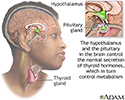Hypothalamus
The hypothalamus is an area of the brain that produces hormones that control:
- Body temperature
- Heart rate
- Hunger
- Mood
- Release of hormones from many glands, especially the pituitary gland
- Sex drive
- Sleep
- Thirst
Information
HYPOTHALAMIC DISEASE
Hypothalamic dysfunction can occur as a result of diseases, including:
Hypothalamic dysfunction
Hypothalamic dysfunction is a problem with part of the brain called the hypothalamus. The hypothalamus helps control the pituitary gland and regulat...

- Genetic causes (often present at birth or during childhood)
- Infection or inflammation
- Injury as a result of trauma, surgery or radiation
SYMPTOMS OF HYPOTHALAMIC DISEASE
Because the hypothalamus controls so many different functions, hypothalamic disease can have many different symptoms, depending on the cause. The most common symptoms are:
- Increased appetite and rapid weight gain
- Extreme thirst and frequent urination (diabetes insipidus)
Diabetes insipidus
Diabetes insipidus (DI) is an uncommon condition in which the kidneys are unable to prevent the excretion of water. DI is not the same as diabetes me...
 ImageRead Article Now Book Mark Article
ImageRead Article Now Book Mark Article - Low body temperature
- Slow heart rate
References
Christian HC. Anatomy and physiology of the hypothalamus and pituitary. In: Robertson RP, ed. DeGroot's Endocrinology. 8th ed. Philadelphia, PA: Elsevier; 2023:chap 13.
Myers MG, Olson DP. Neuroendocrine control of energy stores. In: Melmed S, Auchus RJ, Goldfine AB, Koenig RJ, Rosen CJ, eds. Williams Textbook of Endocrinology. 14th ed. Philadelphia, PA: Elsevier; 2020:chap 39.
Weiss RE. Neuroendocrinology and the neuroendocrine system. In: Goldman L, Schafer AI, eds. Goldman-Cecil Medicine. 26th ed. Philadelphia, PA: Elsevier; 2020:chap 210.
Hypothalamus - illustration
The hypothalamus is a highly complex structure in the brain that regulates many important brain chemicals. Malfunction of this area of the brain may affect basic functions like sleep, appetite, and temperature.
Hypothalamus
illustration
Brain-thyroid link - illustration
Although the thyroid gland releases the hormones which govern growth and metabolism, the brain (the pituitary and the hypothalamus) manages the release and the balance of the amount of hormones circulated.
Brain-thyroid link
illustration
Hypothalamus - illustration
The hypothalamus is a highly complex structure in the brain that regulates many important brain chemicals. Malfunction of this area of the brain may affect basic functions like sleep, appetite, and temperature.
Hypothalamus
illustration
Brain-thyroid link - illustration
Although the thyroid gland releases the hormones which govern growth and metabolism, the brain (the pituitary and the hypothalamus) manages the release and the balance of the amount of hormones circulated.
Brain-thyroid link
illustration
Review Date: 5/12/2023
Reviewed By: Sandeep K. Dhaliwal, MD, board-certified in Diabetes, Endocrinology, and Metabolism, Springfield, VA. Also reviewed by David C. Dugdale, MD, Medical Director, Brenda Conaway, Editorial Director, and the A.D.A.M. Editorial team.




